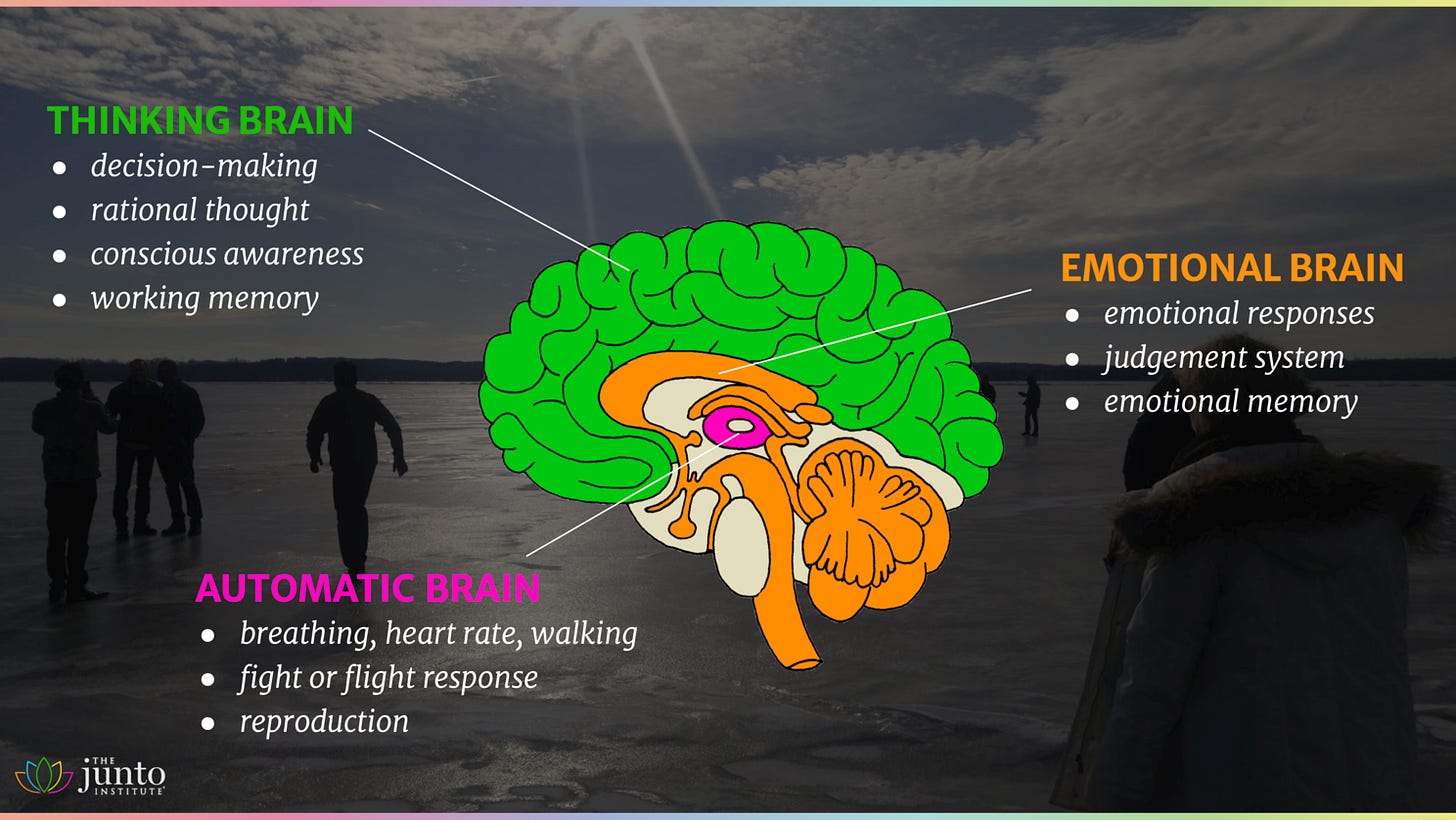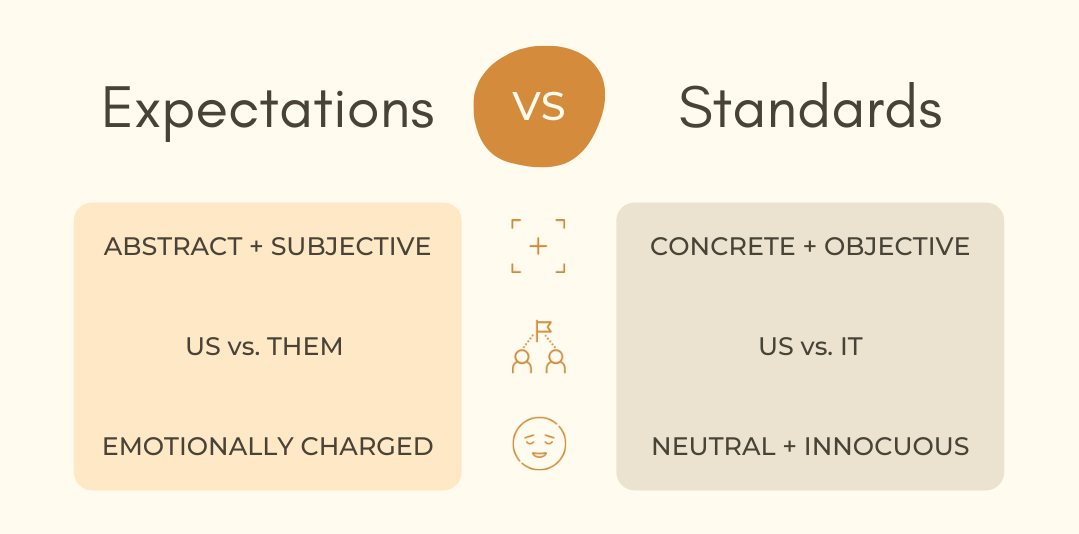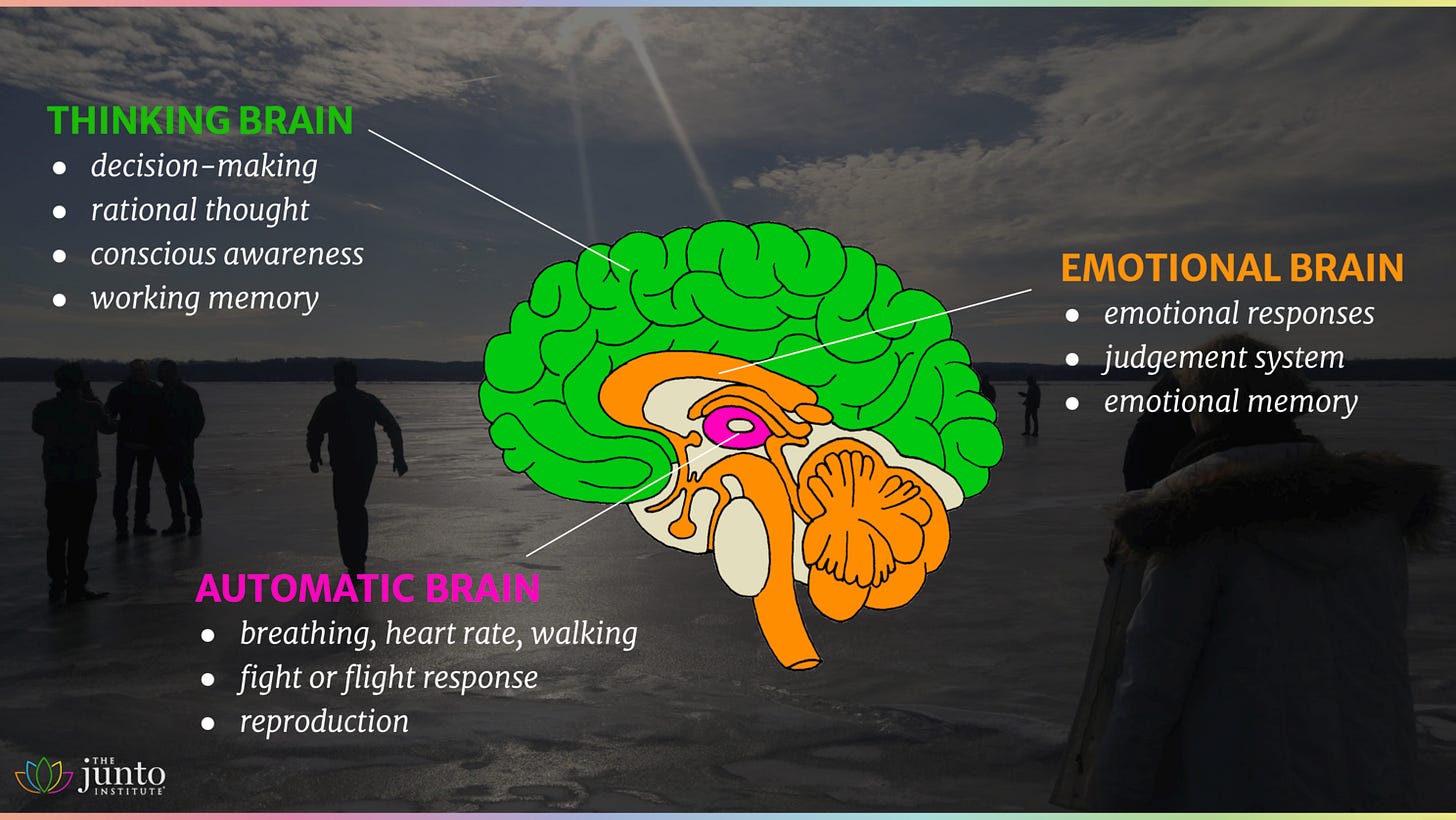This Is Your Brain on Standards
A theory on the brain science behind why standards are healthier and less stressful than expectations.
Note: I am not a neuroscientist, psychologist, or any other type of trained scientist. What I share in this article is based on my research, reflections, experiences, and conversations. If anything is inaccurate or misleading, from a scientific standpoint or otherwise, please tell me in the comments section.
ENGAGING OUR THINKING BRAIN
One of the most fulfilling things about standards, for me, is the different ways it intersects with my other deep passion, emotional intelligence (EI).
In workshops and courses I teach about EI at The Junto Institute, we begin with an introduction of brain anatomy to help people understand its biological foundation, slightly increase their own self-awareness, and discuss practical ways our brain operates at work.
We keep this lesson brief and simple, using the following slide to tell the story.
The three main points we emphasize are:
Our "emotional brain" is responsible for emotion generation, regulation, active and repressed memories, and how all that interplays with our daily behavior.
Our "thinking brain" is responsible for much of our reasoning, rational thought, daily processing, and conscious awareness. It's what we use most of the time when we're doing our work.
When we intentionally engage our thinking brain with our emotional brain, we're practicing emotional intelligence.
When we don't actively engage our thinking brain, we leave ourselves open to the emotional brain taking over. This isn't always a bad thing; sometimes it's a healthy takeover, like when we experience "flow" at work, get lost in a beautiful song or poem or painting, or feel like we're one with nature during a long hike.
Other times, however, the emotional brain taking over can be unhealthy, like when we make irrational decisions, realize after we've said or done something that we literally weren't thinking, or simply "lose it" in an emotional outburst.
YOUR BRAIN ON EXPECTATIONS
In my experience, both personally and from talking with others, we also become vulnerable to this unhealthy takeover when we have expectations in our relationships.
Based on countless conversations I've had about people's expectations, the vast majority of them go unmet. And when that happens, the experience tends to result in negative emotions like hurt, exasperation, frustration, anger, and so on. This is, of course, on top of any anxiety or worry that we may be feeling while simply waiting for the expectation to be met.
Our emotional brain gets to work, generating negative feelings in response to the fact that what we hoped would happen, or what we hoped someone would do, didn't come to fruition.
Your teenager didn't meet your expectation to come home on time. Your employee didn't meet your expectation to be prepared for the big client meeting. Your friend didn't meet your expectation to plan a birthday party for your mutual friend.
Each of these, and countless other unmet expectations, can cause your brain to stimulate the release of cortisol and adrenaline. You get stressed. Your heart rate rises. Your face feels flush. You walk around wondering, "Why?" or "Again?" You promise yourself you won't make the same mistake again. But you do.
You try applying your thinking brain to the situation but it just doesn't seem to work. Your emotional brain has effectively taken over, and all you can do is find yourself casting judgment, feeling negative emotions, and holding a grudge. Sometimes it's fleeting but sometimes it stays with you for hours or days.
YOUR BRAIN ON STANDARDS
In contrast, when you set standards and they're not met, the response is different. You may still feel negative emotions but, for some reason that continues to be validated by many people I share this with, the feelings aren't as extreme. Rather than anger, hurt, or frustration, it may be disappointment, confusion, or wonder. And here's the thing...
That thinking brain of yours usually gets engaged.
From personal experience, and in listening to others share their experiences, we begin asking why the standard wasn't met and what we can do about it next time. We begin using reason, curiosity, rationality, analysis, and other neocortex-housed capacities.
We don't cast judgment on people but rather process. We're not pointing fingers but instead pointing out missed steps or missing steps. We're not falling prey to continued disappointment but rather being inspired by continuous improvement. Again, we're engaging our thinking brain with our emotional brain...and practicing emotional intelligence.
Much of this is due to the differences between expectations and standards I pointed out in a previous article. Here's a summary:
Because standards are more clinical and sober, when they go unmet, I believe our responses parallel these characteristics.
FROM EMOTIONAL BRAIN TO THINKING BRAIN
I recently gave an in-person talk on expectations vs. standards at which I asked people to share their expectations. One attendee, a parent, said they expect their child who's away at college to call once in a while. Pretty reasonable, right? Many of us, either as children or parents, can relate to this in some way.
The parent went on to say how frustrated and angry they get because the child simply never calls home. Not only did I hear those words, I could also sense the emotion in the parent's tone of voice and could literally see it in their facial expressions and body language.
In the workshop, I asked everyone to try following the three steps to convert expectations into standards, and then share them if they wanted. The parent volunteered their freshly-crafted standard: to call their college student at least weekly with specific questions to elicit conversation and specific family updates they wanted their child to be aware of.
As the parent was sharing this standard, I heard and witnessed a completely different emotional demeanor: one that was calm, eager, and maybe even enthusiastic. Because the standard was now their responsibility and more specific, it's unlikely that the parent would experience strong emotions if the standard goes unmet. After all, it would be their fault. And, in my experience, many of us feel stronger emotions when other people don't do what they say as opposed to when we don't do what we say.
ARE STANDARDS BETTER FOR YOUR HEALTH?
I believe that the more expectations we have in our lives, at home and at work, the more they go unmet. The more times they go unmet, the more stress we create for ourselves. And the more stress we create for ourselves, the more likely our health will suffer.
Neuroscientists already know that last part, as summarized here (source):
When stress becomes chronic, [the stress response] system is amped up all the time. The same hormones that are so important for the fight-or-flight response can lead to digestive issues, trouble sleeping, and a weakened immune system, making a person more susceptible to viruses like the flu and chronic health problems.
“Because stress changes the way the brain’s neurons communicate with each other, chronic stress can cause our brains, nervous systems, and our behavior to adjust to a vigilant and reactive state,” says Bruce McEwen, a neuroscientist from Rockefeller University.
That constant vigilance can lead to devastating mental and physical health conditions for the person experiencing it. It can also affect their offspring.
If you go back to the brain anatomy, you'll see that the automatic brain controls our fight-or-flight response. In other words, when we continually encounter stress in our lives, it isn't the emotional brain that takes over, it's the automatic brain.
Sure, the majority of our expectations are not that big of a deal. But when you think about how many expectations we have of the people we work with, live with, and spend time with, over the course of years the stress from those expectations going unmet can add up.
And to think that it has the power to genetically alter the brain so much that our children can be affected hopefully drives the point home: turn your expectations into standards, engage your thinking brain, be more emotionally intelligent, and live with less stress.




